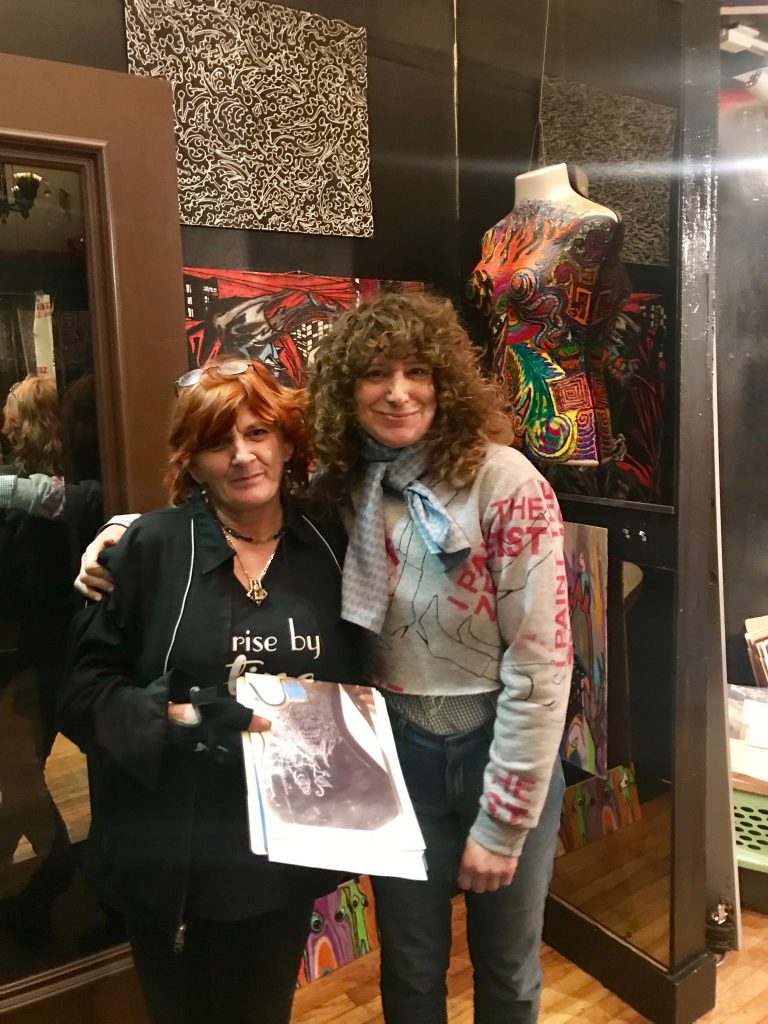
As a child, Oakland homelessness advocate April Anthony dreaded visiting art museums with her parents.
“I was bored to death anytime we went to museums or art shows,” she said. “I thought: ‘Man, this stuff should move!’” As an adult, she started experimenting with making art of her own, pieces that were more dynamic than the art she’d hated. She made her first mobile, out of copper wire and chandelier crystals, in 1992.
A few years after she started creating, Anthony became houseless, and remained so for 18 years. Although she currently lives in an apartment, she spent six years in the Albany landfill, and was part of a group that filed a federal lawsuit against the city after the Albany City Council voted to clear the site in 2013.

April Anthony (left) and Judy Elkan (right) (Kate Wolffe)
During her six years living at the landfill, she continued creating art. Other residents of the community began bringing her wire and colorful beads to incorporate into her mobiles. She became close with the other residents and aware that there were other artists in her midst, creating paintings, sculptures, and wood-burned designs.
In an art exhibition curated by Anthony that opened earlier this month at the ‘Mary Weather’ boutique on 15th Street in Oakland, that artistic community has left its mark, even after the residents of the Albany landfill community have been dispersed. Many of the seven artists showcased lived at the landfill with her, and contributed their works, which include painted pieces, sculpture and photography. The exhibit will be open until the end of the month, Tuesday-Saturday from noon to 7:00 p.m. The gallery’s address is 333 15th Street.
Anthony stumbled into the curator role because she, quite frankly, “knows everybody.” As a board member of both the Albany Homeless Task Force and the Alameda County Healthcare for the Homeless organization, Anthony has served as a bridge for the houseless community and the housed people in the East Bay for over ten years.
Anthony laments that many people have no idea that an houseless art community exists. Putting the exhibition together has been a way to combat that. “I was tired of people saying that we were all disgusting or addicts,” she said. “I want to show what we can do, what we like to do.”
Anthony and Mary Weather proprietor and designer Judy Elkan met on the Oakland-based Homeless Advocacy Working Group (HAWG). Elkan has been working in Oakland on Mary Weather’s main business, screen printing on clothes, since 2009.
As well as designing clothes, Elkan worked for a few years in homelessness advocacy, but was frustrated by what felt like a lack of serious impact. “I realized that what could really help this issue is bringing the housed and unhoused communities physically together,” she said.
To do this, she began opening her boutique up for events like birthdays, and more recently, Thanksgiving, where housed residents came together with their unhoused neighbors. “It’s been really beautiful to open up that kind of space,” she said.
One of the residents that is heavily featured in the show is a houseless artist named Dano, whose colorfully-painted mannequin stands out among his other eye-catching works, which are inspired by both pop-culture and tribal design. Dano, who was trained informally, attended the opening and expressed nerves at having his art displayed. Although he has been drawing and creating for as long as he can remember, this is only the second time his art has been shown publicly.
The art is available for purchase. Elkan and Anthony aren’t sure exactly how the profits will break down, but suspect that 70 percent of the profits will go to the artist, 20 percent will go to the space and curator, and 10 percent will be donated to a cause that benefits the unhoused community.
Houseless artists can get in touch with Anthony about being featured by emailing samples of their artwork—including a statement or short bio—to aprilanthony7@gmail.com.
To those involved, the opening of the gallery feels like a step in the right direction.
“Housed people need to see the other side,” Anthony said. “It’s needed to see your houseless neighbors and what they do.”
Kate Wolffe is a reporter and weekend host at KQED.
